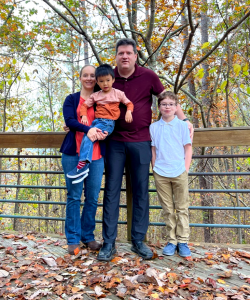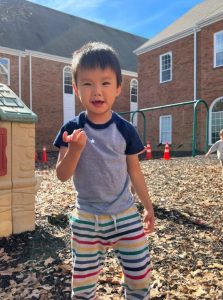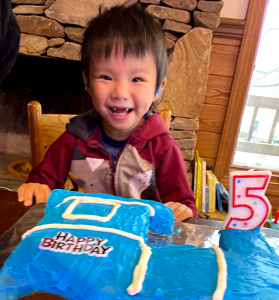SMITH FAMILY CLINIC BRINGS HOPE TO CHILDREN WITH UNDIAGNOSED DISEASES
By Lillie Mermoud
When Laura and Jim McLester adopted Hamilton, they knew he had some medical and developmental challenges. What they did not know is that Hamilton has two genetic disorders so rare that fewer than 50 cases of each disorder are known.

“The expectation with children who are adopted is that once they are settled into a stable home and attached to their family, they will begin to catch up developmentally,” said Laura. “After about a year, we noticed that Hamilton wasn’t catching up. We knew about everything Hamilton was going through developmentally prior to adoption, but we had no name for it and had no idea it was because of genetic syndromes.”
The discovery of Hamilton’s genetic disorders ended an almost two year journey for answers and allowed him and his family to move confidently into the future together.
Searching for answers
When Hamilton was three years old, Laura and Jim traveled to Tainan City, Taiwan, in the winter of 2021 to complete the adoption process and bring Hamilton to their home in Birmingham, AL.
While Hamilton was living in the children’s home he was adopted from, he showed signs of developmental delays such as impaired hearing, a lack of verbal communication, and poor growth. “Hamilton had extremely loving and attentive caregivers at the children’s home,” said Laura. “They recognized the delays he was experiencing and provided access to occupational therapy, audiologists, and speech therapy. They just didn’t have a name for what Hamilton had and couldn’t have known it was a genetic disorder.”
Once Hamilton was home in Birmingham, Laura and Jim focused on building trust and a close relationship as a family. As time went on and Hamilton settled in, Laura and Jim noticed that he was not hitting the developmental milestones expected of a child of his age. Hamilton showed no signs of developing verbal communication, and his access to hearing was not improving despite the use of hearing aids. Hamilton was also experiencing serious dental issues related to enamel hypoplasia, caused by overly thin or a lack of enamel covering the teeth.
Continued work with audiologists and other therapy methods gave Laura and Jim hope, but they realized these methods were not yielding the answers Hamilton needed. There was little positive progress in Hamilton’s challenges, particularly with communication and access to hearing. “We knew Hamilton had opinions and wanted to express himself, but he just wasn’t able to,” said Laura.
As Laura and Jim became involved with online support groups for adults caring for children who are deaf or hard of hearing, they learned that genetic testing was often considered a best practice in the children’s diagnostic journey. Laura felt this could be the missing piece to the puzzle, so she mentioned the idea of genetic testing to an audiologist Hamilton was working with.
Through their audiologist, Laura and Jim were introduced to a family living in North Alabama whose child had also undergone genetic testing. This family recommended that Hamilton seek help from the Smith Family Clinic for Genomic Medicine, LLC, a medical clinic on the HudsonAlpha Institute for Biotechnology campus devoted to finding answers to undiagnosed diseases through genomic sequencing.
A rare diagnosis
Laura reached out to the Smith Family Clinic as well as a few other genomic health clinics, but she quickly became concerned about the long wait times some clinics were announcing. “Some of the clinics were asking us to wait up to nine months for an appointment,” said Laura. “The team at the Smith Family Clinic called us back almost as soon as we had reached out to them. They let us know we could come in immediately for an appointment. I was blown away.”
 Hamilton and his family first met with the genetics team at the Smith Family Clinic in May, 2022. At that time, he was seen by Dr. Anna Hurst, geneticist, and Meagan Cochran, certified genetic counselor and Director of the Smith Family Clinic. “We ordered two different tests for Hamilton, whole exome sequencing and a microarray test, to make sure we were looking at his case as comprehensively as possible,” said Cochran. Whole exome sequencing is a test that sequences parts of DNA responsible for providing instructions to make proteins, allowing clinicians and genetic counselors to find rare variants in those parts of the DNA. A microarray looks for changes in specific genes which may not always be detectable using exome sequencing.
Hamilton and his family first met with the genetics team at the Smith Family Clinic in May, 2022. At that time, he was seen by Dr. Anna Hurst, geneticist, and Meagan Cochran, certified genetic counselor and Director of the Smith Family Clinic. “We ordered two different tests for Hamilton, whole exome sequencing and a microarray test, to make sure we were looking at his case as comprehensively as possible,” said Cochran. Whole exome sequencing is a test that sequences parts of DNA responsible for providing instructions to make proteins, allowing clinicians and genetic counselors to find rare variants in those parts of the DNA. A microarray looks for changes in specific genes which may not always be detectable using exome sequencing.
Ordering both tests helped the clinic’s team to diagnose Hamilton’s symptoms, particularly his complex hearing impairment. “In the end, it was important that both tests were ordered to work in conjunction with each other. Hamilton’s hearing impairment is explained by different syndromes that were picked up by each test,” said Cochran. “If we had not done both tests, we would not have seen the full picture of Hamilton’s diagnosis.”
When the test results returned, the McLesters learned that Hamilton has a chromosomal deletion including the ZMYND11 gene, as well as a pathogenic variant in the MN1 gene. Instances of both of these genetic disorders are extremely rare, with fewer than 50 cases known for each syndrome. Variants in ZMYND11 cause neurodevelopmental disorders, atypical facial features, sensorineural hearing loss, and intellectual disability, while variants in MN1 can cause delays in expressive language, delayed fine motor skills, conductive hearing loss, intellectual disability, atypical facial features, and dental abnormalities.
Laura and Jim breathed a sigh of relief—Hamilton’s diagnosis explained many of the delays he experienced. “We felt like we could finally exhale,” said Laura. “There was no need to push Hamilton to catch up. His diagnosis helped us realize that he’ll run his own race at his own pace.”

A bright future ahead
Hamilton’s diagnosis led Laura and Jim to seek therapy that was more adapted to Hamilton’s needs and capabilities. After realizing that Hamilton may never be capable of verbal communication, his therapy now focuses on growing the communication skills Hamilton already has. At five years old, Hamilton is gaining an increased knowledge of American Sign Language through therapy. “I can now say that Hamilton has language. That is huge,” said Laura. “Hamilton can communicate who he is and what his needs are much more effectively as he learns new signs and skills every week.”
Hamilton’s diagnosis had an impact far beyond identifying more adapted therapies. Laura and Jim, as well as Hamilton’s eleven-year-old brother, James, are learning sign language. The McLesters have started attending deaf church services and plugging into Birmingham’s deaf community. Perhaps most importantly, the diagnosis Hamilton received has allowed Laura and Jim to have a clearer picture of Hamilton’s future, as well as their own.
In addition to Hamilton’s dual diagnoses for his existing symptoms, the McLesters also learned through genetic testing that Hamilton is at a highly increased risk of developing high cholesterol at a young age, potentially before the age of 18. “Genetic testing allowed us to know what’s ahead and to make better plans for the future,” said Laura. Most children don’t receive cholesterol tests, but Laura and Jim can ensure that he receives the appropriate screenings.
In favor of genetic testing
Laura is now an advocate for the power of genetic testing in cases of undiagnosed rare disease. “When we first came to the Smith Family Clinic, I thought we would know whether or not Hamilton has one of the more well-known genetic syndromes you hear about,” said Laura. “I was impressed by the depth of knowledge the clinic’s genetic counselors had and just how much information they could give us about these rare syndromes. What we learned informs our present and our future.”
When asked if she would recommend genetic testing to another family struggling with the same challenges as theirs, Laura replied: “Genetics is a powerful tool that can tell us things Hamilton can’t tell us or that a routine medical exam wouldn’t be able to tell us. Getting genetic testing doesn’t mean that there’s anything that needs to be ‘fixed’ with your child. Hamilton is exactly who he was meant to be. But genetic testing gives you the insight to connect the dots and empowers you to know what’s ahead.”
The Smith Family Clinic for Genomic Medicine, LLC., is a wholly-owned subsidiary of HudsonAlpha Institute for Biotechnology that has been established to diagnose patients with undiagnosed and misdiagnosed diseases through genome sequencing or other genetic tests. The HudsonAlpha Foundation’s 2023 Double Helix Dash raises funds in support of the Smith Family Clinic and HudsonAlpha’s childhood genetic disorder research programs.

